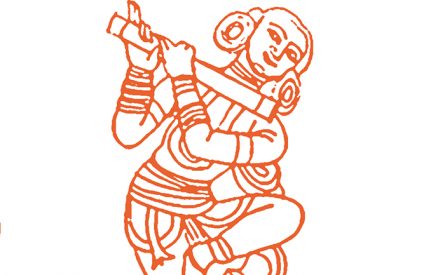Connections – Week Three
FAITH IS A FINE INVENTION...
‘Faith’ is a fine invention
When gentlemen can see —
But Microscopes are prudent
In an Emergency.
Emily Dickinson (1830-1896)
Thanks to Elisabeth Smith in London
MILAIPERUNKANTAN, KUR 136
Love, love
They say. Yet love
is no new grief
nor sudden disease; nor something
that rages and cools.
Like madness in an elephant,
coming up when he eats
certain leaves,
love waits
for you to find
someone to look at.
A classic Tamil poem, c. 100-300 BCE, translated by AK Ramanujan in his anthology, Interior Landscape (1967)
Thanks to Ian Sanjay Patel in London
I WASTED TIME, AND NOW DOTH TIME WASTE ME...
For now hath time made me his numbering clock:
My thoughts are minutes; and with sighs they jar
Their watches on unto mine eyes, the outward watch,
Whereto my finger, like a dial’s point,
Is pointing still, in cleansing them from tears.
Now sir, the sound that tells what hour it is
Are clamorous groans, which strike upon my heart,
Which is the bell: so sighs and tears and groans
Show minutes, times, and hours: but my time
Runs posting on in Bolingbroke’s proud joy,
While I stand fooling here, his Jack o’ the clock.
This music mads me; let it sound no more;
…
Yet blessing on his heart that gives it me!
For ‘tis a sign of love; and love to Richard
Is a strange brooch in this all-hating world.
Shakespeare, Richard II, Act V, Sc v (1597)
WHERE THE HAND GOES...
Where the hand goes, there goes the eye;
where the eye goes, there goes the mind;
where the mind goes, there is expression;
and where there is expression, there is rasa (flavour, mood).
A ditty summarising Indian performance aesthetics (cf., Natya-Shastra, c. 200 BCE)
FOUR BE THE THINGS...
Four be the things I am wiser to know:
Idleness, sorrow, a friend, and a foe.
Four be the things I’d been better without:
Love, curiosity, freckles, and doubt.
Three be the things I shall never attain:
Envy, content, and sufficient champagne.
Three be the things I shall have till I die:
Laughter and hope and a sock in the eye.
Dorothy Parker (1893-1967)
Thanks to Elisabeth Smith in London
WHAT IS TO BE DONE...
What is to be done, O People? for I do not recognise myself.
I am neither Christian, nor Jew, nor Gabr, nor Muslim.
I am not of India, nor of China, nor of Bulgaria.
I am not of this world, nor the next, nor of Paradise, nor of Hell.
My place is the Placeless, my trace is the Traceless;
I have put duality away, I have seen that the two worlds are one…
Jalal al-Din Rumi (1207-1273)
THE DACCA GAUZES
…for a whole year he sought to accumulate
the most exquisite Dacca gauzes.
– Oscar Wilde / The Picture of Dorian Gray
Those transparent Dacca gauzes
known as woven air, running
water, evening dew:
a dead art now, dead over
a hundred years. “No one
now knows,” my grandmother says,
“what it was to wear
or touch that cloth.” She wore
it once, an heirloom sari from
her mother’s dowry, proved
genuine when it was pulled, all
six yards, through a ring.
Years later when it tore,
many handkerchiefs embroidered
with gold-thread paisleys
were distributed among
the nieces and daughters-in-law.
Those too now lost.
In history we learned: the hands
of weavers were amputated,
the looms of Bengal silenced,
and the cotton shipped raw
by the British to England.
History of little use to her,
my grandmother just says
how the muslins of today
seem so coarse and that only
in autumn, should one wake up
at dawn to pray, can one
feel that same texture again.
One morning, she says, the air
was dew-starched: she pulled
it absently through her ring.
Agha Shahid Ali (1949-2001)
Thanks to Ian Sanjay Patel in London


